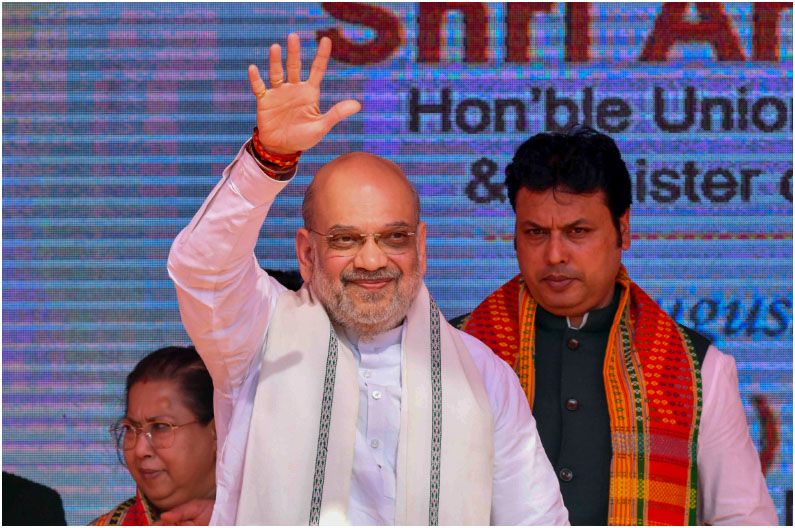Burha Para (Tripura), Dec 22: “I am happier than you. Prime Minister Modi ji is equally delighted that we have successfully rehabilitated you after four decades,” stated Union Home Minister Amit Shah while addressing members of the Bru tribal community in this remote village on Sunday.
Shah emphasized that the central government, along with the Tripura government, has been making dedicated efforts to rehabilitate displaced Bru (Reang) families, ensuring they can live with dignity in their own homes.
He expressed his immense joy upon confirming that the Modi government has successfully resettled all the displaced Bru individuals in Tripura.
“We’ve provided you with 25 different livelihood opportunities, including animal husbandry, dairy farming, honeybee cultivation, and millet cultivation,” he mentioned to the attendees.
In addition to engaging with the villagers, the home minister visited various homes to inquire about their issues and the government services they were receiving.
When a few residents informed him that they had yet to receive their Ayushman Bharat health cards, he guaranteed they would receive them within two days and directed the district magistrate to oversee this process.
Bru migrants fled from three districts in Mizoram—Mamit, Lunglei, and Kolasib—into North Tripura district during 1997, 1998, and 2009, escaping severe ethnic conflict between the Bru and Mizo communities.
Uttam Kumar Reang conveyed to Shah that prior to the central government’s intervention for their rehabilitation, the Bru refugees were living under dire conditions.
“Previously, we lived in makeshift huts, but now we inhabit concrete houses. We possess Aadhaar and voter IDs, and we have participated in elections,” Reang noted.
The rehabilitation of Bru tribals took place in accordance with a quadripartite agreement signed on January 16, 2020.
The agreement was made between the governments of India, Tripura, Mizoram, and representatives of Bru organizations for the permanent resettlement of Bru migrants in Tripura.
While approximately 70 percent of the Bru (Reang) tribals identify as Hindu, the remainder are Christians.
A total of 12 sites have been earmarked in Tripura’s North Tripura, Dhalai, Gomati, and South Tripura districts for establishing Bru tribal resettlement colonies. Out of these, nine are on forest land and three are on government land.
Settlement activities are ongoing at these designated locations, according to officials.
As stipulated in the agreement, 754 acres of land has been set aside for the resettlement of these families.
The total number of families slated for rehabilitation under the agreement is 6,935, encompassing a population of 37,584, as reported by officials.
Common developmental initiatives, such as installing power lines, building brick roads, providing deep tube wells for drinking water, constructing power infrastructure, household connectivity, solar street lights, and opening new fair price shops, anganwadi centers, schools, and health sub-centers, are nearly complete in 11 locations.
Development work at the last approved resettlement colony, Kala Lawgang in South Tripura district, is currently in progress and is expected to conclude by the end of this financial year, officials indicated.
In total, Rs 821.98 crore is allocated for the resettlement of these families across the 12 colonies, according to an official source.
Out of this total, Rs 793.65 crore will be financed by the Union home ministry, while the state government will contribute Rs 28.34 crore towards common development projects.
To date, the home ministry has disbursed Rs 693.13 crore, with Rs 406.42 crore going directly to beneficiaries through direct benefit transfers. (PTI)


Leave a Reply